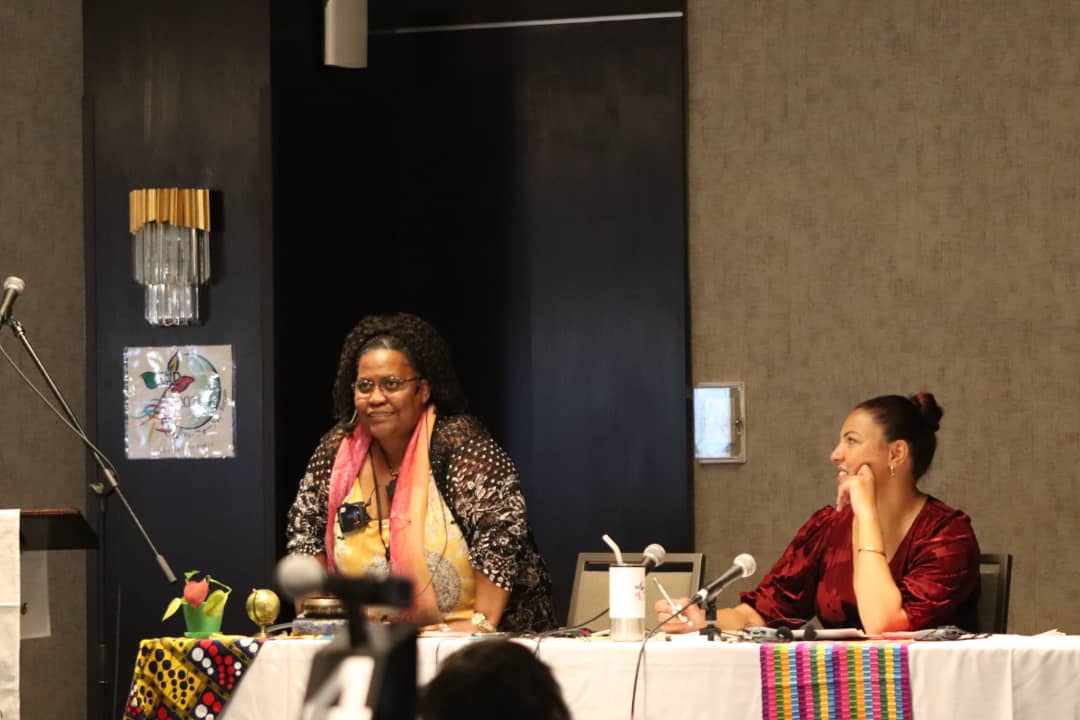CND Forum – Thursday, August 29
With a prayer for Transformation, in music and song, Visitation Province opened today asking that we be graced by the gifts of the Holy Spirit and transformed to serve.
Our morning presenter, Marie Claire Rufagari spoke about the complex nature of identity. Like an onion it is made up of many overlapping layers. In some times and spaces we are daughters and sons, in others mothers or fathers, grandparents, aunts and uncles. Our identity comes from an interwoven story of generations who moved around and through places. It cannot be defined by reference to a single culture. Who we are is framed by what we bring from our historical heritage, our relationships and experiences. In turn, what others see when they meet us is shaped by what they bring from their own historical heritage, their relationships and experiences.
She went on to say that we learn who we are by experiencing how others respond to us. If someone meets me when I am with my mother, they meet me as a daughter. If they are parents of daughters, they bring to our meeting their own image and expectations about how mothers and daughters relate. We both bring and form impressions that colour how we respond when we meet. We each start from our own particular points of reference which are dependent on many factors. Context is everything and culture is fluid.
In some cases, we have an unexpected response to another or receive an unexpected response from them. This happens when our world-view is challenged because we are unable to recognize shared landmarks. We experience the discomfort of Culture Shock, and at that moment the possibility of connection is blocked. Whoever holds the power position, may become protective and stop listening. We need to recognize these moments and find a solution that makes sense to all participants. This involves opening safe and supportive spaces for dialogue and requires that we are honest about who we are and know when we need to ask for help.
Jeanne-Marie Rugira reminded us that after the colonizer leaves, those who were taught by them take up the work and continue to colonize themselves. So it is easier to decolonize territories than the spirit. What is in the mind takes time to evolve and the many wounds that have been inflicted need healing. Our first responsibility is to confront our own stories and heal our own wounds. Pope Francis has said that healing is the most important work of the Church which must stop looking down from above and become like a field hospital, in close proximity to those who are wounded recognizing its own need of healing.
We were invited to consider how we individually and as CND communities can work to humanize ourselves and the world.
Unfortunately, at the end of the morning, we were informed that a case of Covid had been confirmed. Preventative measures and protocols were put in place right away by the hotel and the Forum Team.
The afternoon workshops focused on Interculturality, Intergenerationality and Intersectionality. Presenters gave testimonies that spoke of steps taken with First Nations People on a long journey toward reconciliation; of lives lived with marginalized groups, in remote locations with few resources; of the love and strength found within these communities; and, of where and how the CND have stood in radical solidarity with those who are the least amongst us. They challenged us to share ways that we might make a new way together and offered wisdom from Mi’kamq author Louise Zimanyi – “When we walk together in a good way we learn to know the world through two eyes”.
Tonight the second group of sisters and associates gathered in Visitation circles led by the Transformation Committee …. while others enjoyed the music of a string quartet…A moment of beauty and joy!
